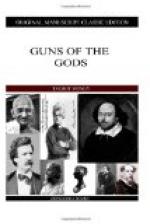“A hundred guarded it. I looked for a hundred pipal trees, and found them—near the River Palace. But they were not changed once a month. I looked from there, and saw another hundred pipal trees—here, below this fort—exactly a hundred. But neither were they changed once a month. Then I counted the garrison of the fort—exactly a hundred, all told. Then I knew. Then I remembered that ‘who looks for gold finds gold,’ and saw your husband digging for it. It seemed to me that the vein of gold he was following should lead to the treasure, so I pulled strings until Samson blundered, trying to trick us. And now we have the treasure, and the English do not know. And I am maharanee, as they do know, and shall know still better before I have finished! But what are we to do with Gungadhura’s body? It shall not lie here to rot; it must have a decent burial.”
Very late that night, Tom Tripe moved the guards about on the bastions, contriving that the road below should not be overlooked by any one. The moon had gone down, so that it was difficult to see ten paces. He produced an ekka from somewhere—one of those two-wheeled carts drawn by one insignificant pony that do most of the unpretentious work of India; and he and Ismail, the Afridi gateman, drove off into the darkness with a covered load.
Early next morning Gungadhura’s body was found in the great hole that Samson’s men had blasted in the River Palace grounds, and it was supposed that a jackal had mangled his body after death.
(That was what gave rise to the story that the English got the treasure after all, and that Gungadhura, enraged and mortified at finding it gone, had committed suicide in the great hole it was taken from. They call the great dead pipal tree that is the only one left now of the hundred, Gungadhura’s gibbet; and there is quite a number, even of English people, who believe that the Indian Government got the money. But I say no, because Yasmini told me otherwise. And if it were true that t he English really got the money, what did they do with it and why was Samson removed shortly afterward to a much less desirable post? Any one could see how Utirupa prospered, and he never raised the taxes half a mill.
Samson had his very shrewd suspicions, one of which was that that damned American with his smart little wife had scored off him in some way. But he went to his new post, at about the same time that the Blaines left for other parts, with some of the sting removed from his hurt feelings. For he took Blaine’s rifle with him—a good one; and the horse and dog-cart, and a riding pony—more than a liberal return for payment of a three-thousand rupee bet. Pretty decent of Blaine on the whole, he thought. No fuss. No argument. Simply a short note of farewell, and a request that he would “find the horses a home and a use for the other things.” Not bad. Not a bad fellow after all.




